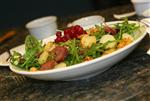 |
 |
 |
||
    |
||||
|
||||

Plant-based flavonoid may cut ovarian cancer risk
|
|
Reuters Health
Wednesday, April 22, 2009

NEW YORK (Reuters Health) - Women who eat greater amounts of plant-based foods and drinks with the naturally occurring flavonoid, apigenin, may have a decreased risk for ovarian cancer, study findings suggest.
Apigenin, found in celery, parsley, red wine, tomato sauce, and other plant-based foods may be "particularly beneficial," said Dr. Margaret A. Gates, of Brigham and Women's Hospital and Harvard Medical School, in Boston, Massachusetts.
Flavanoids are compounds with antioxidant properties that protect cells against damage by oxygen molecules. In a study that compared flavonoid intake among women with and without ovarian cancer, women reporting the highest apigenin intake had a "borderline significant decrease" in ovarian cancer risk over women reporting the lowest apigenin intake, Gates and her associates report in the International Journal of Cancer.
"These results are promising," Gates told Reuters Health, "but more research is needed to confirm this association."
The researchers assessed the foods commonly eaten over a one-week period by 1,141 women with ovarian cancer and 1,183 women without.
The women, 51 years old on average, had similar characteristics except those with ovarian cancer reported more known risk factors for the disease and had slightly greater body mass and daily calorie intake. By contrast, the disease-free "controls" had a slightly healthier overall diet.
From the food data, Gate's group calculated the women's intake of 5 common flavonoids -- myricetin, kaempferol, quercetin, luteolin, and apigenin -- frequently obtained by drinking tea or red wine, or eating apples, romaine or leaf lettuce, kale, blueberries, oranges, celery, or tomato sauce.
The investigators found no association between total flavonoid intake and ovarian cancer risk in analyses that allowed for factors potentially associated with ovarian cancer risk such as age, oral contraceptive use, childbirth, breastfeeding, history of tubal ligation, and physical activity.
Only apigenin intake, as noted, was associated with a suggestive decrease in ovarian cancer risk.
These findings, in concert with results of other studies suggesting an inverse association between intake of certain flavonoids and risk of ovarian cancer, highlight the need for further research, Gates and her colleagues suggest.
SOURCE: International Journal of Cancer, April 2009.
Reuters Health
© 2009 Thomson Reuters. All rights reserved. Reuters content is the intellectual property of Thomson Reuters or its third party content providers. Any copying, republication or redistribution of Reuters content, including by framing or similar means, is expressly prohibited without the prior written consent of Thomson Reuters. Thomson Reuters shall not be liable for any errors or delays in content, or for any actions taken in reliance thereon. "Reuters" and the Reuters Logo are trademarks of Thomson Reuters and its affiliated companies. For additional information on other Reuters media services please visit http://about.reuters.com/media/.
Related News:
More News on this Date
Related MedlinePlus Pages:
| Home | Health Topics | Drugs & Supplements | Encyclopedia | Dictionary | News | Directories | Other Resources | |
| Disclaimers | Copyright | Privacy | Accessibility | Quality Guidelines U.S. National Library of Medicine, 8600 Rockville Pike, Bethesda, MD 20894 National Institutes of Health | Department of Health & Human Services |
Date last updated: 23 April 2009 |
